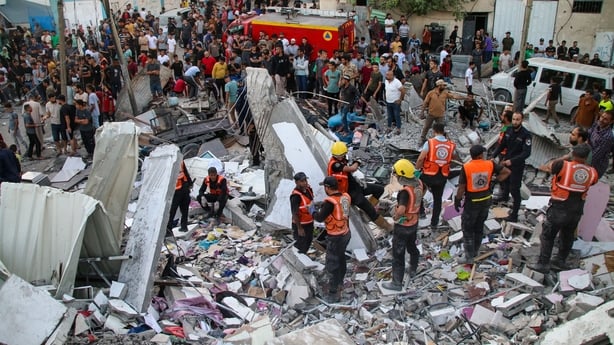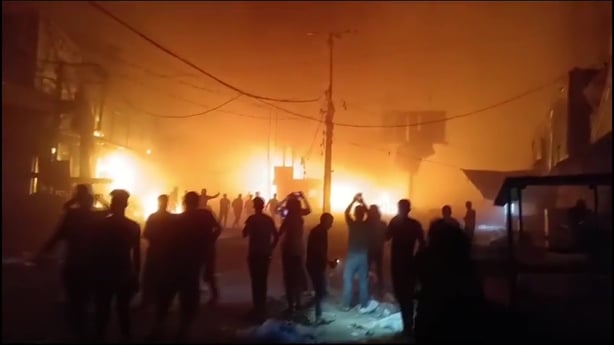A second convoy of 14 aid trucks entered the Rafah crossing from the Egyptian side to besieged Gaza tonight, Juliette Touma, director of communications at the UN Relief and Works Agency (UNRWA), told Reuters in Gaza by phone from Amman.
Witnesses reported a blast and ambulance sirens on the border earlier.
Israel's military said one of its tanks accidentally hit an Egyptian position near the border with Gaza.
Several Egyptian border guards sustained minor injuries after being hit by fragments of an Israeli tank shell, a spokesperson for the Egyptian army said.
A witness and a medical source said seven people were wounded and taken to hospital.
Israel's defence force "expresses sorrow regarding the incident, which is being investigated," it said in a statement, giving no further details.
There were a total of around 19 trucks in today's convoy carrying medical and food supplies, the security and humanitarian sources said.
A first convoy of 20 trucks of badly-needed supplies had entered Gaza yesterday through Rafah, which had previously been out of operation after bombardments hit on the Gaza side of the border and amid wrangling over conditions for delivering aid.
Distribution of those supplies began today, but aid officials are still warning of a humanitarian disaster as supplies of food, water and fuel run low.
Israel imposed a total blockade and launched air strikes on Gaza in response to a deadly attack on Israeli soil by Hamas on 7 October.
The Rafah crossing, the main entry and exit point to Gaza that does not lead to Israel, has become the focus of a push to deliver aid as humanitarian conditions in Gaza worsen.
UN officials say at least 100 trucks a day would be required in Gaza to cover urgent needs.
Before the outbreak of the most recent conflict, several hundred trucks had been arriving in the enclave daily.
UN humanitarian chief Martin Griffiths told Reuters yesterday that work was under way to develop a "light" inspection system, whereby Israel could check the shipments but ensure a sustained flow.
We need your consent to load this rte-player contentWe use rte-player to manage extra content that can set cookies on your device and collect data about your activity. Please review their details and accept them to load the content.Manage Preferences
As fears mount of a wider conflagration, Iran warned the region could spiral "out of control" and the Pentagon moved to bolster its forces in the Middle East.
Hamas militants stormed into Israel from Gaza on 7 October and killed at least 1,400 people, mostly civilians on the first day of the raid, according to Israeli officials.
It was the worst attack on civilians in Israel's history and coincided with the end of the religious holiday of Sukkot.
Israel's retaliatory bombing campaign has killed more than 4,600 Palestinians, mainly civilians, according to the Hamas-run health ministry.
More than 40% of all Gaza's housing has been damaged or destroyed, according to the UN citing local authorities, and Israel has halted food, water, fuel and electricity supplies.
Israel has massed tens of thousands of troops around the enclave for an anticipated ground invasion.
Israel increased its attacks overnight and killed "dozens of terrorists" in and around Gaza City, including the deputy commander of the Hamas rocket network, military spokesman Daniel Hagari said today.

'We are preparing'
Hamas said overnight raids on Gaza killed at least 80 people and destroyed more than 30 homes.
In central Gaza's Deir al-Balah, an AFP journalist reported seeing the bodies of children lie on the bloodied floor of a morgue.
A man clutched his dead toddler and people wept as they identified the bodies of their relatives.
Israel has warned more than one million residents of northern Gaza to move south for their safety, and the UN says more than half of the territory's population is now internally displaced.
Hundreds of thousands of civilians are believed to remain in and around Gaza City in the north, unwilling or unable to leave.
Iranian Foreign Minister Hossein Amir-Abdollahian today said that if the United States and Israel "do not immediately stop the crime against humanity and genocide in Gaza, anything is possible at any moment and the region will go out of control".
Read More:
UN chief urges ceasefire to end Gaza's 'godawful nightmare'
Crossfire: The EU, Gaza and the Hamas attacks
Thousands take to streets in support of Palestinians
US Defence Secretary Lloyd Austin yesterday said that he had ordered the deployment of a second carrier strike group in the eastern Mediterranean and additional Patriot battalions.
The Pentagon said the move aimed to defend US ally Israel amid what it called "escalations by Iran" and its proxies across the region.

It also said it was notifying additional troops to "prepare to deploy orders" without specifying how many or when they could be dispatched.
A ground invasion poses myriad challenges for Israeli troops, who are likely to face Hamas booby traps and tunnels.
"Gaza is densely populated, the enemy is preparing a lot of things there - but we are also preparing for them," chief of staff Lieutenant General Herzi Halevi told one infantry brigade on a front-line visit.
Israel must also weigh the safety of the 212 hostages it says were abducted by the militants.
A peace summit in Egypt on Saturday ended without a joint statement, as Western officials demanded a clear condemnation of Hamas and Arab attendees issued their own statement criticising world leaders.
Pope Francis pleaded for peace and humanitarian aid during his weekly Angelus prayer in Rome.
"War is always a defeat, it is a destruction of human fraternity. Brothers, stop!"
Inside Gaza, shell-shocked residents were left homeless and unsure where to go next as plumes of smoke billowed from sites targeted by Israeli strikes.
Om Ahmad Abu Sanjar was sleeping in her Rafah home when she "woke up to the glass shattering on us and bricks falling".
"We got out miraculously," she said.
The scale of the bombing has left basic systems unable to function, with the UN reporting dozens of unidentified bodies were buried in a mass grave in Gaza City because cold storage had run out.

